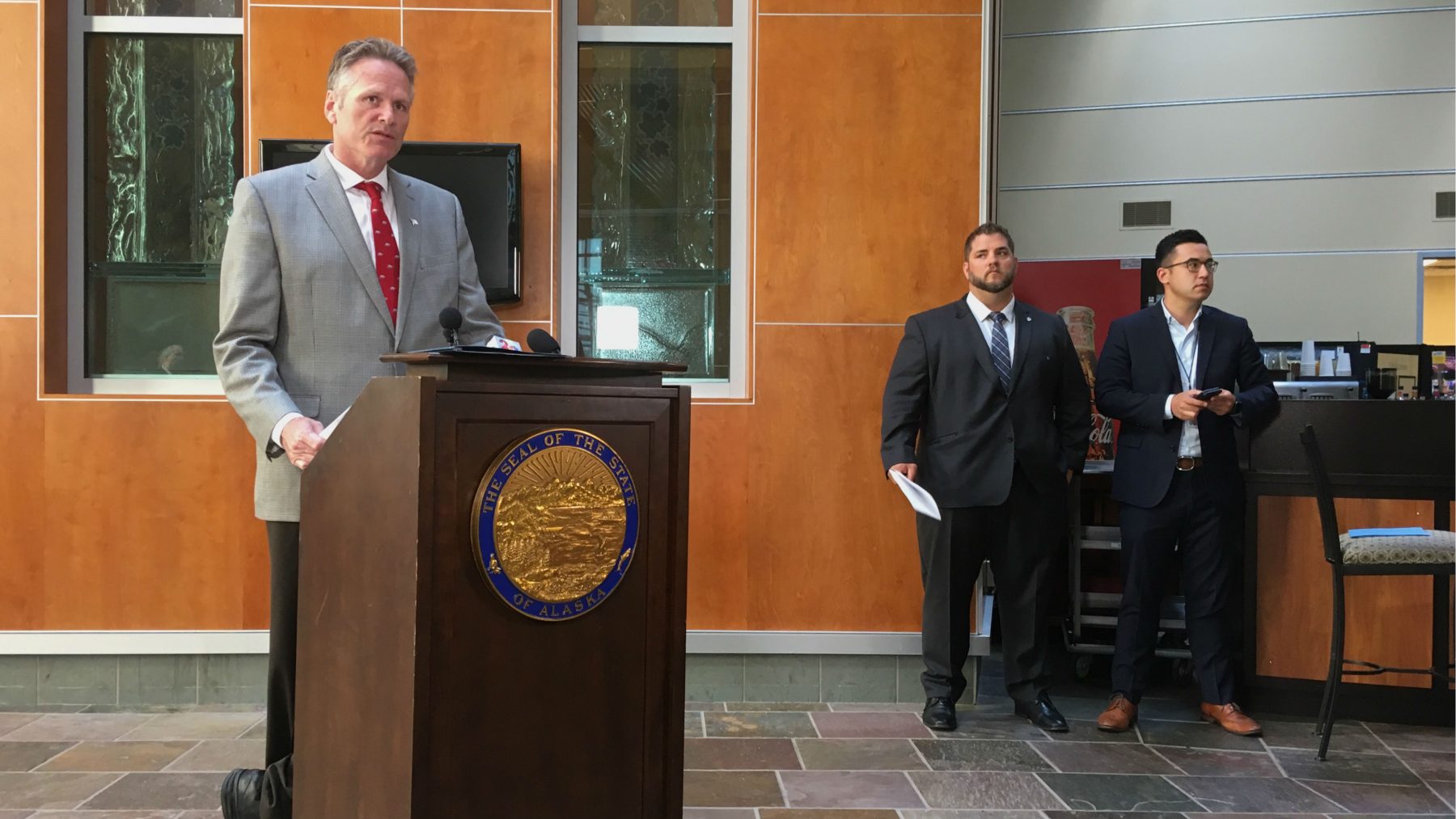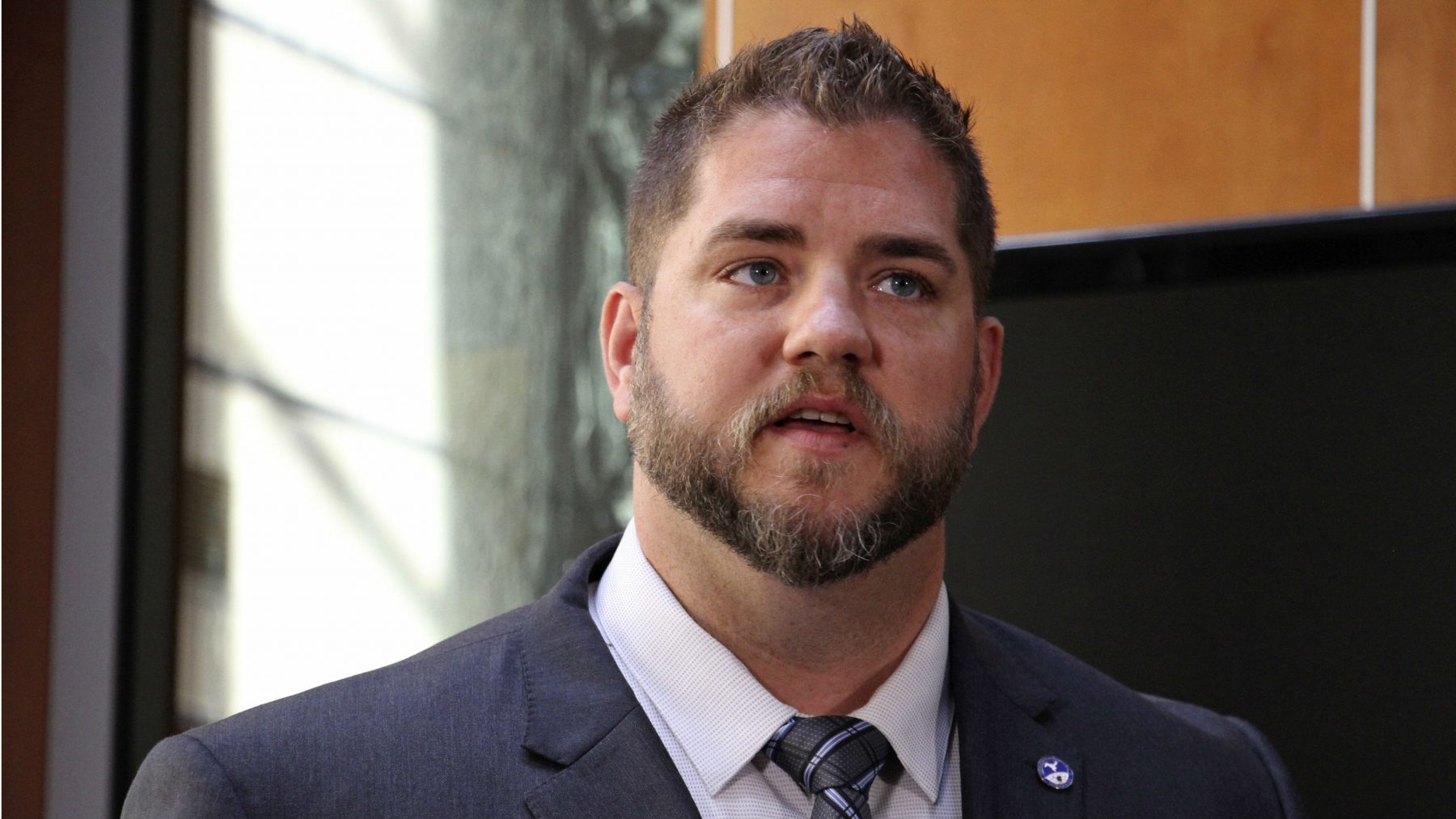Alaska gov seeks new study of psychiatric institute privatization

U.S. authorities have restored certifications for the Alaska Psychiatric Institute, and state health officials are now re-evaluating privatizing the state-owned hospital.
A state Request For Proposal issued Monday solicits bids “for a study of the feasibility of privatizing the Alaska Psychiatric Institute.” On the same day, state executives and hospital administrators gathered in the API lobby for a press conference announcing the hospital’s recent re-accreditation by the Centers for Medicare and Medicaid Services.
The facility’s status was thrown into jeopardy last year, following the discovery of dozens of regulatory violations. Now, according to state officials, API has a reinstated state license and renewed federal certifications, and is therefore eligible to continue receiving federal funds.
“Things are headed in the right direction,” said Gov. Mike Dunleavy, speaking at Monday’s press conference alongside commissioners from the Department of Health and Social Services.
Running below capacity
But there’s still work to do, he added. The 80-bed hospital is operating at below 60 percent capacity, and health department officials said it’s been a struggle to hire the staff needed to reach full capacity.

“One of the issues we have in hiring both psychiatric nurses and psychiatric nurse assistants is the compensation level,” said DHSS Commissioner Adam Crum. “We have to make sure that we can work toward getting competitive.”
As of October 2018, the hospital had 49 beds available, and former director Duane Mayes said he planned to use an infusion of state funding to hire close to 50 new psychiatric nurse assistants, bringing APl to full capacity within three to six months, the Anchorage Daily News reported.
In January, Crum invoked his statutory authority to assume management of the hospital, citing ongoing problems with safety, regulatory compliance and staffing. A private company, Wellpath Recovery Solutions, received a contract to provide administrative support to API in two phases through 2024, with the intent of helping the hospital “return to its full capacity by June 30, 2019,” according to DHSS. In May, the contract was amended to continue on a month-to-month basis through the end of the year; the requirement to make all 80 beds available remained.
As of Monday, the facility had 46 beds available, and Deputy Commissioner Albert Wall said Wellpath had accomplished everything the state had asked of it.
There’s currently no timeline for reaching full capacity at API, Crum said. Hiring remains a challenge.
“This is something that’s an ongoing issue,” he said. “Getting individuals to fill those roles has been the most difficult aspect.”
State moves forward on privatization
Meanwhile, the state is moving forward with plans to explore privatizing the state-owned hospital. A 2017 study examining the same thing concluded that privatizing API would likely increase costs. Instead of full privatization, the 2017 report recommended a blended approach, privatizing certain non-core services while maintaining direct care under state management.
But a lot has happened since 2017, Wall said. DHSS believes a new feasibility study is necessary to evaluate privatization in the current context.
“They’ll look at staffing levels, they’ll look at curriculum, or what their modality of treatment is for different types of patients, they’ll look at acuity level of patients, they’ll look at cash flow, they’ll look at everything,” Wall said Monday. “And then they’ll make recommendations.”
The decision to explore privatization was criticized by the Democratic co-chairs of the House Health and Social Services Committee. In a statement, Bethel Rep. Tiffany Zulkowsky called the new study a waste of resources, while Anchorage Rep. Ivy Spohnholz said the potential for privatization made it “difficult to recruit and retain qualified staff.”
“If the administration is serious about getting the hospital back to full capacity, they should take privatization off the table and aggressively recruit to fill funded but vacant positions at API,” Spohnholz said in a written statement.
The state is accepting proposals on the privatization evaluation through Aug. 26.
Related stories from around the North:
Canada: Hospitalization for youth with mental health disorders up 58% in Canada’s Northwest Territories over past decade, CBC News
Sweden: Social Democrats lose Arctic stronghold over healthcare in Sweden’s regional elections, Radio Sweden
United States: Alaska’s state-run psychiatric hospital unsafe for workers, report concludes, Alaska Public Media



